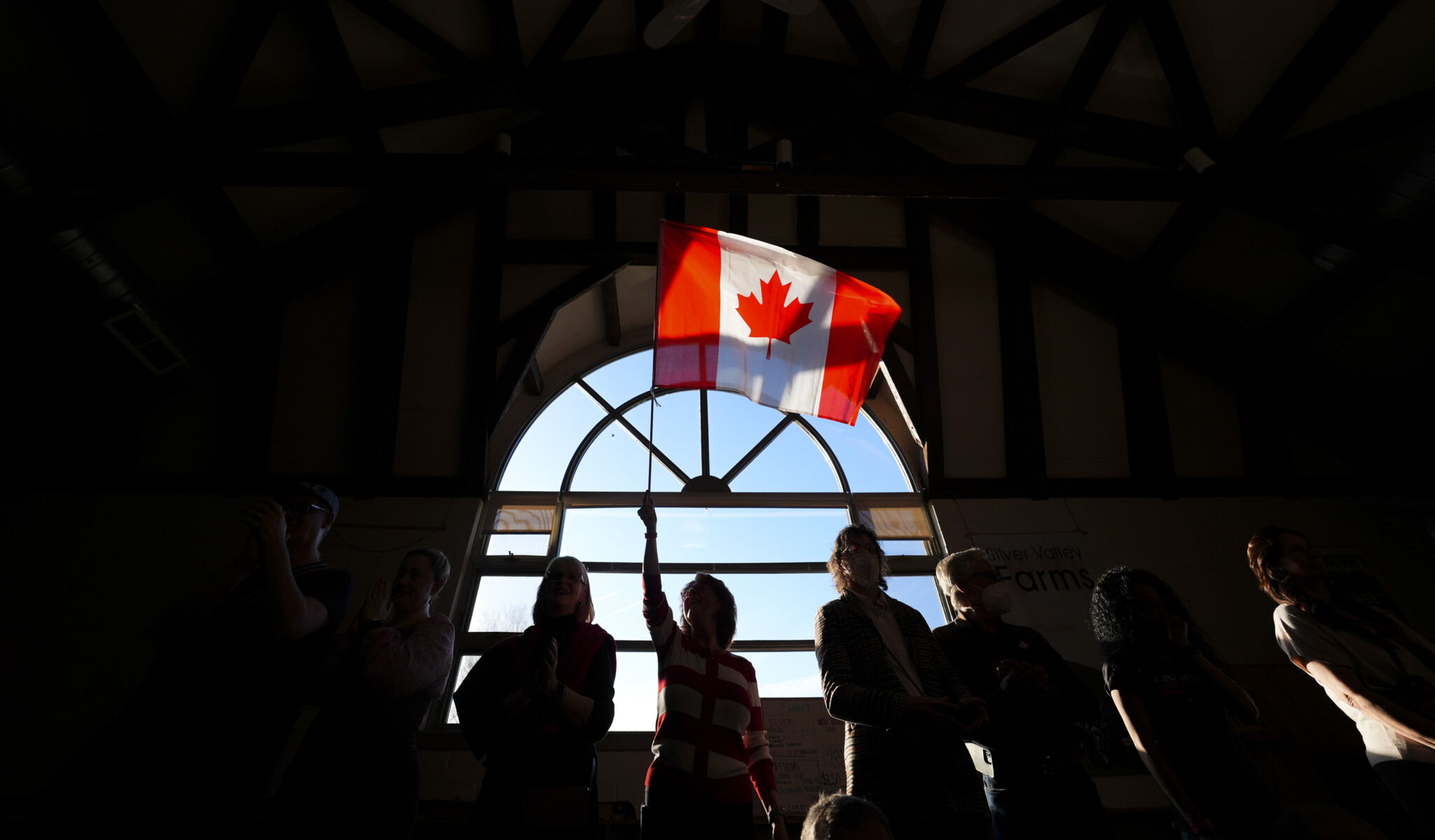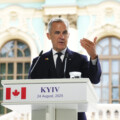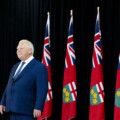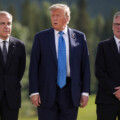
This year marks the 60th anniversary of Canadian philosopher George Grant’s Lament for a Nation: The Defeat of Canadian Nationalism, a seminal work that reshaped Canadian political discourse. Published in 1965, Grant’s critique of American cultural dominance and technological modernity challenged Canadians to reconsider their national sovereignty and identity. To mark the occasion, this summer, The Hub will feature a series of essays from big thinkers exploring the book’s enduring legacy and how its insights remain vital to understanding Canada and its relationship with the United States today.
A recent episode of Hub Dialogues featured host Harrison Lowman speaking to Michael Ignatieff, former leader of the Liberal Party of Canada, who offered his reflections on the 60th anniversary of Lament for a Nation, and how George Grant’s (who happens to be his uncle) argument applies to current-day Canada. See the transcript below for Ignatieff’s remarks.
HARRISON LOWMAN: A recent piece you wrote in The Globe and Mail has the headline: “What price are we willing to pay for Canada?” To ensure we remain who we are. Let me put your headline to you, Michael, what price should we be willing to pay for Canada?
MICHAEL IGNATIEFF: So we’ve been thinking about this since Confederation, and it’s always been a balance between how we cope with living beside the United States, how we balance economic integration with the United States, and national independence. How we balance our desire to have a prosperous life next door to the greatest empire the world has ever seen, but at the same time, remain politically independent. And we’ve always come out with a very complicated compromise.
Every time you ask Canadians, “Do you want to have a much more independent, self-reliant economy that has much less to do with the United States?” we basically say, “No, we want economic integration.” The 1988 election was a clear mandate for free trade. Now we’re dealing with an American government that wants to pull back on free trade and protect themselves with tariffs, and Canadians are suddenly saying, “Could we get back to the vanished world of free trade?”
So we’ve always had a nuanced answer. We’ve wanted national independence. We’ve been extremely proud of what we’ve achieved with that national independence, but we also want economic integration. It’s never been entirely clear that we can have two without costs and pain, and we’re going through a very painful moment right now.
It seems to me that the new prime minister clearly understands, and the provincial premiers understand, and Canadians understand, that we’ve got to tear down the internal trade barriers. We’ve got to build some east-west connectors. We’ve got to diversify our economic outlook. We used to sell it all to Boston and New York. Now we’ve got to sell it to Spain or Portugal or wherever. And we’re not ready for that.
The challenge of a much more nationalist economic policy is going to put us all under a lot of pressure. I’m strongly in favour of it, but let’s get real about what it’ll cost. It’s going to take us a decade of hard work and sacrifice, and possibly higher taxes.
It’s not clear what we’re going to be able to work out with the Americans. We’ve just had the [G7] meeting in Kananaskis, and who the hell knows what we decided. There’s no criticism of Mr. Carney, who I think is a pretty good prime minister. But we don’t know whether we can get a low tariff or zero tariff trade arrangement with the United States, and if we can’t, then we have to adjust the whole economy to a different set of competitive pressures. And nobody knows whether we can do it. Look, we can do it because we’re Canada and because we’ve had some very tough experiences in the past. I don’t want to pour cold water down anybody’s neck, least my own, but we gotta wise up to how tough this adjustment is going to be.
HARRISON LOWMAN: On that balance you just described, George Grant, your uncle, strangely enough, this year is the 60th anniversary of his seminal work, Lament for a Nation: The Defeat of Canadian Nationalism, an emotional critique about American dominance and Canada’s inability to withstand it.
He talks about this question you just mentioned: can we maintain an independent, sovereign state and have economic and security integration with the U.S.? This feeling of potentially being swallowed up, we’ve been asking it for 150 years. How do your uncle’s worries fit into that balance you just described?
MICHAEL IGNATIEFF: Well, George Grant was my uncle. He was my mother’s younger brother, and he was an absolute sweetheart. He was particularly a sweetheart because, as everybody knows, I’m a secular liberal, and he was a religious conservative, but he was so nice to me. I think of him with nothing but affection, and his Lament for a Nation was really formative in my own sense of this issue.
I think the book is stunningly relevant in 2025. I’ve reread it just recently, and have been struck once again, that he asked the seminal question, which is, “If we have defence integration, that is, if we’re locked into North American defence on the one hand and on the other hand, are 80 percent, 90 percent, market dependent on the United States, can we actually be an independent country?” And by independence, he didn’t just mean when our politicians press a button, is there anything on the other side? That is, do we have any sovereignty effectively as a country? He meant much more than that. Can we be Canadian? And the sense of not being American.
His sense of what it was to be a Canadian was British. On the one hand, British parliamentary institutions, British traditions, British moderation, even British liberalism. And on the other hand, he thought what was constituted us was le fait français–the fact that we were two peoples with two languages, two religions, two cultures, and this is what had made us what we were.
It’s significant that in 1965, he didn’t give much salience to something that’s much more salient now, namely, the Aboriginal reality of Canada. But he did see these two [British and French] linchpins of our country coming apart under the pressure of economic integration. He felt the crucial moment in 1963 was when we accepted to station [American] nuclear-tipped missiles on Canadian soil. And he just thought, “Well, that’s the end of us as a country.”
And he’s, in some strict sense, been proven wrong. Canada still exists. But the tension between the political and the economic remains visceral to our problem. And every time this has been put to vote, as I repeat, Canadians have not wanted to build a barrier, to build an independent, sovereign economy that tariffs against the United States. We gave that up in the late 19th century; the last person to propose that was Prime Minister Sir John A. Macdonald.
So we’ve accepted economic integration. And if you go to Windsor, or anywhere in Western Ontario, you see total integration of productions across borders. We feel a visceral sense of existential anxiety when Trump says, “We don’t want to manufacture anything with you, and we want to reshore all of our industrial production that we used to make with you back in the United States.”
This simply overturns 40, 50 years of our assumptions about our economy. However this settles out, I think we’re in a new world. Because I don’t think this is just Trump. If you go back to Biden, Biden’s economic policy was strongly protectionist, what we would call, in technical terms, “mercantilist.” It was very America First, to the intense irritation of the Europeans.
I think we’ve moved from a free trade globalization world in which Canada accepted full integration and globalization to a much more protectionist, economic nationalist world everywhere. I don’t think we’re going back. And therefore, Trump is an avatar of a new world, not an exception. Given that fact, I think we’re going to have to settle in for a decade of reorienting the Canadian economy, east, west, and that’s going to be a big job.









